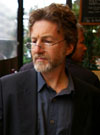COE Faculty Fellows Explore Water’s Past, Water’s Future
Wesleyan’s College of the Environment has appointed faculty members Johan “Joop” Varekamp, Clark Maines, Vijay Pinch and Elise Springer as 2011-12 fellows. The fellows will gather with other Wesleyan scholars and undergraduate students for a year-long academic “Think Tank” on a critical environmental issue. The 2011-12 topic is “Water’s Past, Water’s Future.”
The aim of the Think Tank is not only to generate a deeper understanding of the thematic issue, but also to produce scholarly works that will influence national and international thinking and action on the issue. Scholars and students in the think tank are expected to produce scholarly works by the end of the academic year.

Joop Varekamp, the Harold T. Stearns Professor of Earth Science, professor of environmental studies, will focus on water as a medium that distributes pollutants like mercury and arsenic through the environment. He will examine the stress on water resources that have become polluted with a wide array of such contaminants. He’ll also look at human impacts on water flow and water management through intentional water management (dikes, ponds, reservoirs) or as unintentional consequences of other activities.
“My main example will be the historic fur trade that led to the disappearance of beavers and their river dams. The fur trade changed the course of history through colonization of the Americas, as well as the course of rivers,” he says.

Clark Maines, the Kenan Professor of the Humanities, professor of medieval studies, archeology and art history, will focus on his current research at three monastic sites in France that represent one important way that water was used and managed during Europe’s medieval and early modern periods. He will consider tactics like damming and diverting rivers, constructing underground systems for capturing excess and used water and disposing of it, as well as building decorative basins and fountains for contemplation.
“Together with think-tank colleagues, I’ll be thinking about the environmental impact these waterworks brought about as well as at the way in which past water uses have influenced the way we think about using this resource in the contemporary period,” Maines explains.

William “Vijay” Pinch, chair and professor of history, will focus his work in the Think Tank on human social and cultural evolution in relation to large bodies of water. He will be examining three intersecting historiographical traditions: world history, maritime history and marine environmental history.
“I look forward to learning from my Think Tank colleagues about the past and future of the human relationship to water, especially as it relates to questions of fresh water management, science, and policy. I am particularly interested, as well, in marine habitats, resource depletion and coastal ecosystem protection,” Pinch says.

Elise Springer, assistant professor of philosophy, will consider the interplay between water and moral theory.
“It is obvious that we can apply the tools of moral theory to challenges and crises related to water, such as to the alleviation of suffering due to water shortages, or to the resolution of conflicting claims about rights to water,” she says. “Yet we may also consider how water might be beginning to inform our understanding of morality.”
In particular, Springer’s work will explore the promise of an ethics animated by “water” metaphors such as fluency, dynamics, and circulation, rather than by the more “solid” conceptual touchstones of principles on one hand and results or outcomes on the other.
Maines, Pinch, Varekamp and Springer represent the second cohort of COE fellows. The 2010-11 fellows, including Dana Royer, Gina Ulysse and Gary Yohe are currently focusing on the theme “Vulnerability of Social, Economic and Natural Systems to Multiple Sources of External Stress.”
Fellows will report on their findings at the annual Earth Day Celebration.

